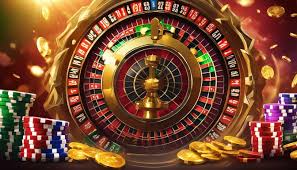Casinos have long been synonymous with excitement, glamour, and the allure of fortune. For many, the flashing lights, the ringing sounds of slot machines, the shuffle of cards, and the intoxicating rush of winning (or losing) create a compelling environment. But beneath the surface, the world of kapuas88 login is far more complex, blending entertainment, psychology, culture, and economics.
The History and Evolution of Casinos
The concept of gambling dates back to ancient civilizations, where dice games and wagers were a common pastime. The word “casino” itself originates from the Italian word casa, meaning “house.” Originally, it referred to small villas or summer houses where people would gather for leisure activities, often involving games and socializing. Over time, the meaning of the word evolved to refer specifically to establishments dedicated to gambling, and by the 17th century, gambling houses became more formalized in Europe.
In the 19th and 20th centuries, casinos grew into major attractions, especially in places like Monaco, Las Vegas, and Atlantic City. These glamorous locations attracted wealthy tourists and eager gamblers alike, all hoping to test their luck in games like poker, blackjack, and roulette. With the expansion of online casinos in the 21st century, the world of gambling has only become more accessible, allowing anyone with an internet connection to try their hand at games of chance and skill.
The Psychology Behind Casino Games
One of the key elements that make casinos so compelling is the psychology behind the games. Casinos are designed to create a sensory overload. Bright lights, enticing sounds, and constant movement bombard the senses, creating an environment of excitement and anticipation. Many of these elements are strategically used to keep players engaged for extended periods, encouraging them to play longer and risk more.
The concept of “near misses” is a key psychological tactic in games like slot machines. A near miss happens when a player almost wins but falls just short. This moment of near success can be powerful in reinforcing a player’s desire to keep playing, as it triggers the brain’s reward system. Studies have shown that near-misses can be just as reinforcing as an actual win, which is why people often feel an urge to continue playing despite losing.
Additionally, the concept of “losses disguised as wins” is prevalent in many games. This occurs when a player wins a small amount of money but has already lost more than that amount overall. The small win is designed to keep players feeling like they are making progress, which can be psychologically encouraging, even if they are actually losing money.
The Most Popular Casino Games
While every casino is different, some games have become universally iconic and define the casino experience for many players.
- Slot Machines: The quintessential casino game, slot machines are easy to play, offer a wide range of themes and stakes, and provide the chance for big payouts. They work based on a random number generator (RNG), ensuring that every spin is independent and unpredictable. Many modern slot machines also feature interactive bonus rounds and jackpots, keeping players engaged and entertained.
- Blackjack: This classic card game is popular for its blend of strategy and chance. Players aim to get a hand total as close to 21 as possible without exceeding it. Unlike games of pure chance, blackjack allows players to employ various strategies and improve their odds by counting cards or using optimal betting strategies. This balance of luck and skill has made blackjack a favorite among seasoned gamblers.
- Roulette: Often considered one of the most glamorous casino games, roulette involves betting on the outcome of a spinning wheel. The wheel has 37 or 38 pockets (depending on whether it’s a European or American roulette table), and players can wager on a single number, a range of numbers, or colors. The unpredictability of the spin, combined with the numerous betting options, makes roulette a favorite for high-stakes players.
- Poker: Poker is more than just a casino game—it’s a cultural phenomenon. Whether it’s Texas Hold’em, Omaha, or Seven-Card Stud, poker blends skill, strategy, and psychology in a way that few other games do. Professional poker tournaments, such as the World Series of Poker (WSOP), have made household names of players who can read their opponents and bluff with the best of them.
- Baccarat: This card game has a certain level of elegance associated with it, often depicted in movies as a favorite of high-rollers. Baccarat is easy to learn and typically involves betting on one of three possible outcomes: the player’s hand, the banker’s hand, or a tie. Despite its simplicity, the game carries a certain mystique, especially among those who enjoy high stakes.
The Modern Casino Experience
Casinos today offer far more than just gaming. Many are complete entertainment complexes, with luxury hotels, high-end restaurants, spas, live performances, and shopping centers. The modern casino experience is designed to cater to a wide range of tastes, ensuring that players can enjoy a full experience, whether they’re there to gamble or simply to relax and enjoy the atmosphere.
Online casinos have revolutionized the industry in recent years. With advancements in technology, players can now enjoy their favorite casino games from the comfort of their own homes. The rise of live dealer games, which allow players to interact with real dealers via video feed, has brought a sense of authenticity and immersion to online gambling, replicating the in-person experience as closely as possible.
Furthermore, the advent of virtual reality (VR) and augmented reality (AR) promises to take the casino experience to an entirely new level. Soon, players may be able to immerse themselves in a fully interactive casino environment without leaving their homes, where they can walk around the casino, interact with other players, and feel the excitement of a physical venue.
The Controversies and Risks of Gambling
While casinos provide entertainment for millions, they are not without their risks and controversies. The biggest concern surrounding gambling is addiction. The thrill of winning, combined with the potential for huge losses, can create a dangerous cycle for vulnerable individuals. This is why many casinos have implemented responsible gambling programs, offering resources and tools for players to manage their behavior, set limits, or seek help if needed.
There are also concerns about the social impact of gambling, particularly in regions where casinos become focal points of local economies. Critics argue that gambling can lead to financial distress, crime, and social problems. On the other hand, proponents point out that casinos can generate significant tax revenue and create jobs, benefiting local communities.
The Future of Casinos
As technology continues to evolve, the future of casinos seems poised to embrace even more advanced features. With the rise of cryptocurrencies, blockchain, and online gaming, the next generation of casinos may involve more decentralized systems and virtual currencies. These advancements could make gambling more secure and accessible, while also creating new opportunities for innovation.
In conclusion, casinos are a unique blend of entertainment, risk, and reward. Whether in a brick-and-mortar venue or online, they offer an environment where the excitement of chance meets the thrill of competition. As the industry continues to evolve, one thing is certain: the allure of casinos will remain a powerful draw for those seeking both fortune and fun.



